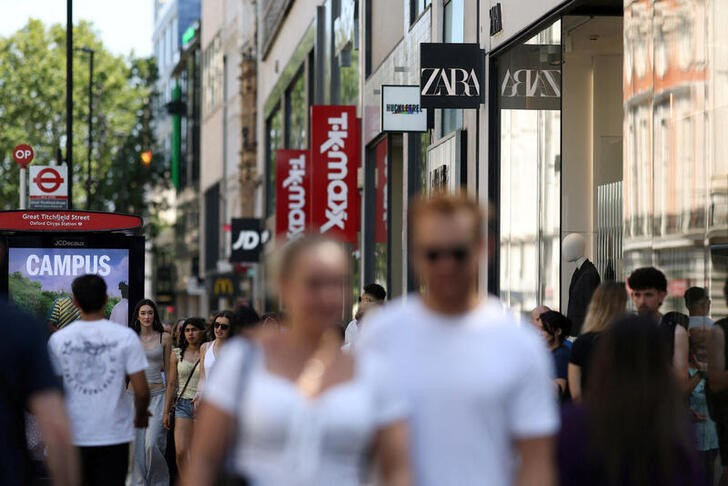By David Milliken and Andy Bruce
LONDON (Reuters) -Britain's economy recorded a second quarter of strong growth as it recovered from last year's shallow recession but it lost momentum as it entered the second half of 2024, suggesting the Bank of England remains on course to cut interest rates again.
Gross domestic product grew 0.6% in the second quarter of 2024 after a 0.7% expansion in the first quarter which was the fastest in more than two years, the Office for National Statistics said.
But in June alone monthly output growth slowed to zero from 0.4% in May, as heavy rain hurt retail sales and a doctor's strike contributed to a 1.5% drop in healthcare activity.
Sterling edged up marginally after the data, which did little to shift financial markets' expectations that the BoE will cut rates once or twice more this year.
Uncertainty in the run-up to July 4's election - which saw the Labour Party win a large majority after 14 years in opposition - might also have weighed on growth in June, said Thomas Pugh, economist at accountancy firm RSM UK.
"Overall, the UK economy has shown a solid performance in the first half of the year, but we need to see signs of rising incomes and confidence feeding through into actual spending and investment to drive growth over the next year," he said.
Suren Thiru, economics director at the Institute of Chartered Accountants in England and Wales, expected quarterly growth to slow as interest rates remained near a 16-year high, despite this month's BoE cut. Wage growth was also likely to moderate and a long-term productivity problem persisted, he said.
At the start of the month the BoE raised its annual growth forecast for 2024 to 1.25% from 0.5% due to a stronger-than-expected start to the year and an expectation of 0.7% quarter-on-quarter growth in the three months to June.
But it was less upbeat about the outlook for the remainder of 2024, seeing growth slow to 0.4% in the third quarter and 0.2% in the final three months of the year - which it views as closer to the economy's underlying growth rate.
SLOW RECOVERY
Britain's economy has grown slowly since the COVID-19 pandemic, expanding just 2.3% between the fourth quarter of 2019 and the second quarter of 2024.
Only Germany, which was also hit hard by surging energy costs after Russia's invasion of Ukraine, has done worse among the world's largest advanced economies.
Output per head has risen in the past two quarters but is 0.8% lower than before the pandemic as economic growth has been too weak to keep up with a rising population driven by record levels of immigration.
Prime Minister Keir Starmer said he wanted the economy to achieve annual growth of 2.5% when campaigning in the run-up to July 4's election - a rate that Britain has not regularly reached since before the 2008 financial crisis.
Finance minister Rachel Reeves set a more formal target that Britain should enjoy the fastest per capita growth in gross domestic product among the Group of Seven advanced economies for two consecutive years.
Reeves said the latest data showed the challenge facing the new government and repeated her position that she would need to take tough decisions to improve economic fundamentals.
James Smith, UK economist at ING, said the strong quarterly growth was unlikely to give Reeves more spending power for her Oct. 30 budget, as official forecasters were unlikely to revise up their assessment of Britain's longer-term potential.

Growth in output per hour worked has slowed in most advanced economies since the late 2000s - limiting increases in living standards - and Britain's long-standing problem of low business investment was exacerbated by the public's 2016 vote to leave the European Union.
Thursday's data showed business investment in the second quarter was 1.1% lower than a year earlier.